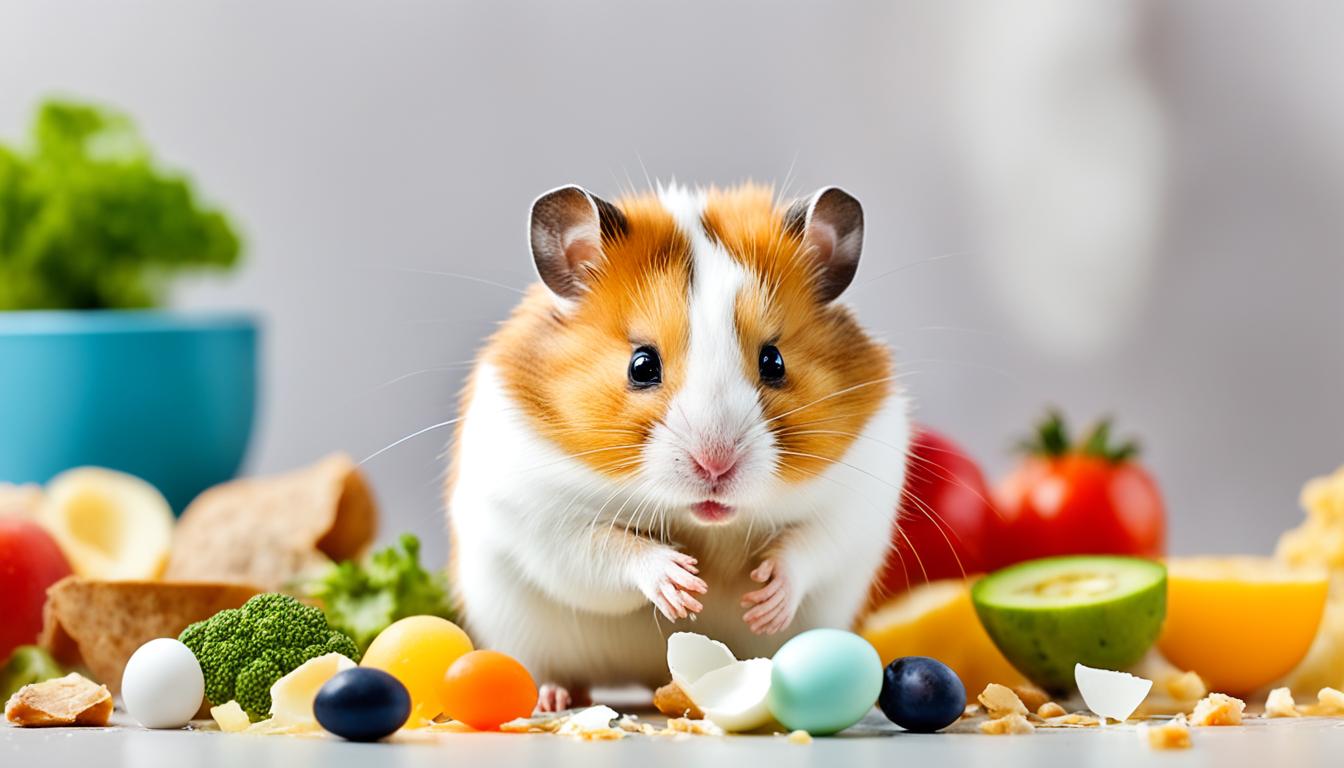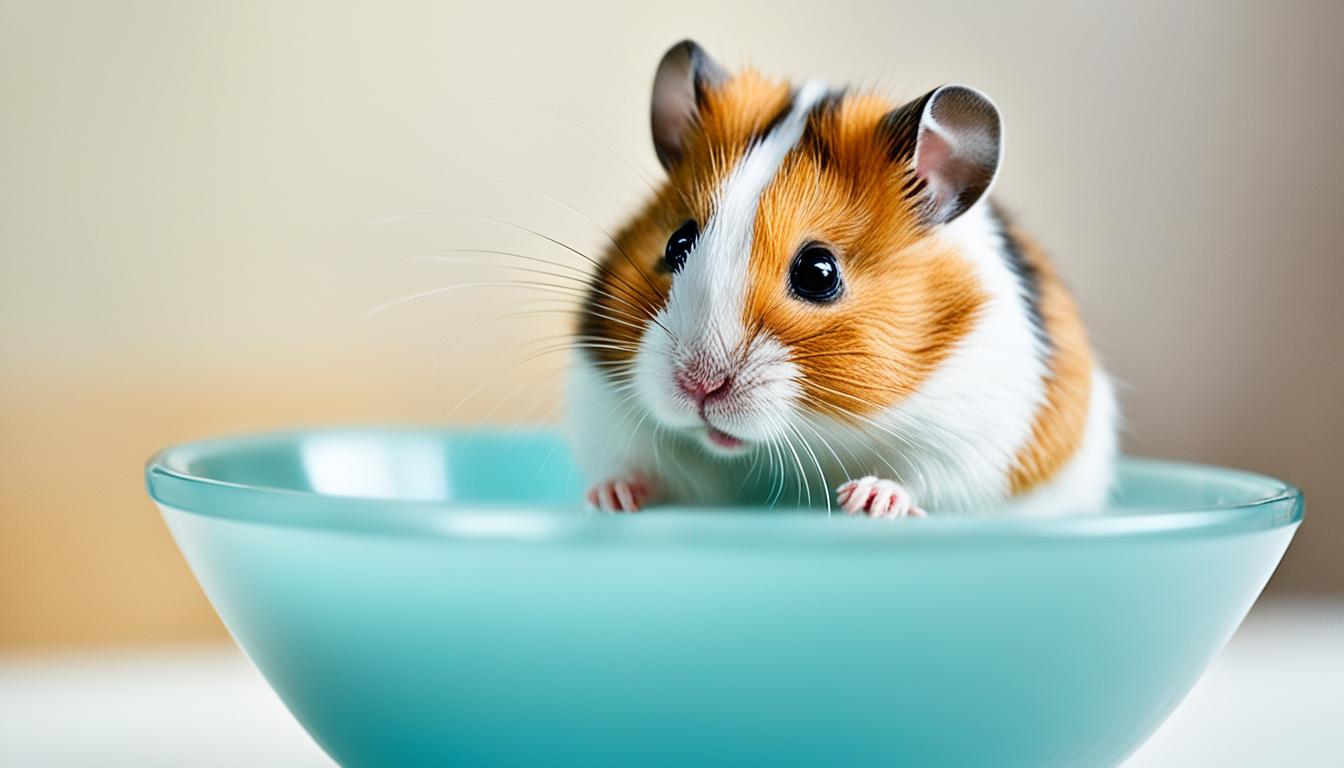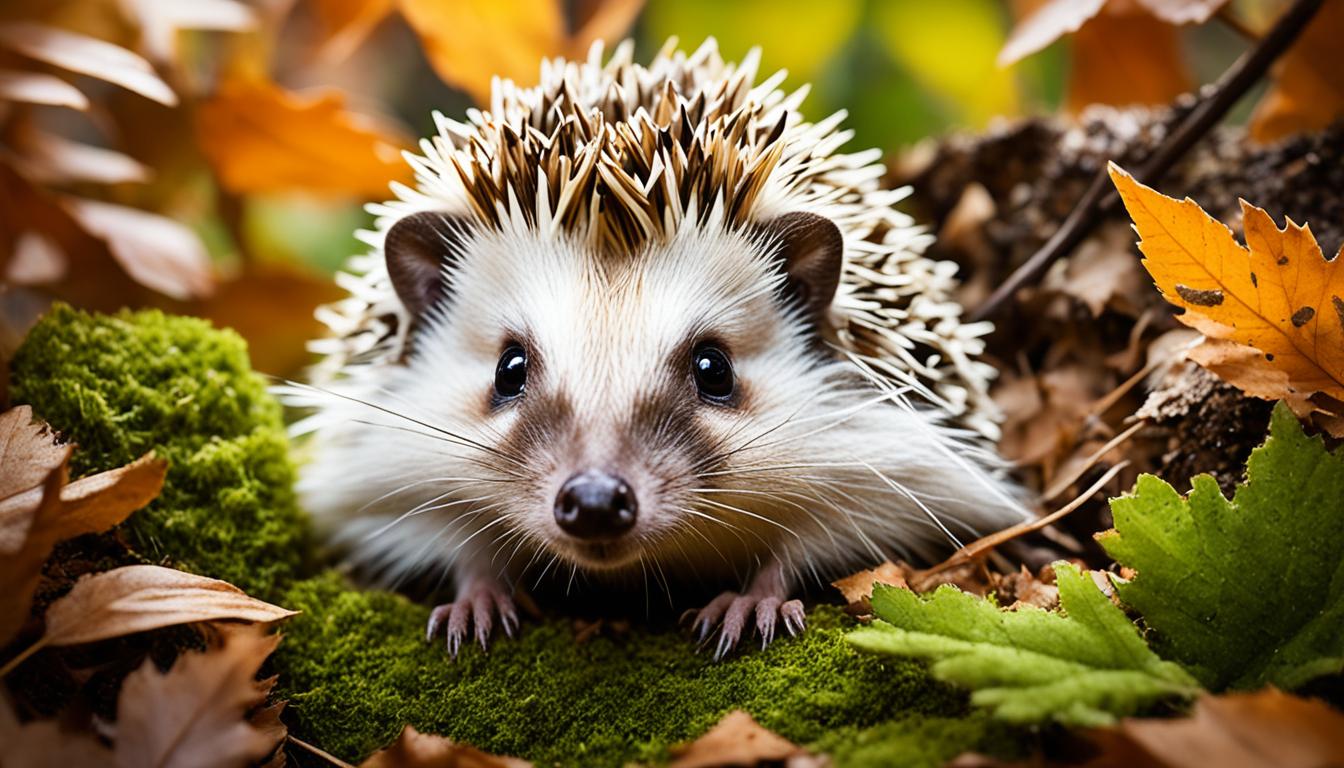Did you know that hamsters are omnivores? These small creatures have an impressive capability to eat a variety of foods, including eggs! Yes, you heard correctly – eggs! Although it may seem strange for a hamster to snack on an egg, it is actually a nutritious treat that can supply them with vital nutrients. If you are interested in learning about whether hamsters can consume eggs and how it can improve their diet, continue reading to find a detailed nutritional guide for your adorable little pets.
Key Takeaways:
- Eggs can be given to hamsters as a treat, providing them with animal protein, antioxidants, and vital vitamins and minerals.
- Hamsters’ natural diet consists of both plant and animal foods, and eggs can be a healthy addition to mimic their natural intake.
- Eggs should be prepared without any added seasonings, salt, or butter, and offered in moderation alongside a balanced pellet-based diet.
- It’s crucial to maintain variety in a hamster’s diet by including fresh fruits, vegetables, and whole grains.
- Remember to always provide fresh water to keep your hamster hydrated and healthy.
Hamsters’ Natural Diet and Protein Needs
Hamsters are omnivores and have a diet that consists of both plant and animal foods in the wild. It is important to provide pet hamsters with a diet that mimics their natural one as much as possible to ensure their nutritional needs are met.
One crucial aspect of a hamster’s diet is the inclusion of a good source of animal protein. Protein is essential for their growth, development, and overall health. One such source of protein is eggs, which can be a valuable addition to a hamster’s diet.
Eggs are an excellent source of protein, containing approximately 6 grams of protein per boiled egg. This makes them a nutritious option for hamsters. However, it is important to note that eggs should be offered as supplements and in small amounts, as part of a balanced diet.
“Eggs provide a valuable source of protein for hamsters, but it’s essential to offer them in moderation.”
Hamsters should primarily consume a commercial pellet diet specifically formulated for small rodents. These pellets are designed to provide the necessary nutrients and protein for hamsters. The protein content of commercial pellets typically ranges between 15-25%, ensuring that hamsters receive adequate protein for their needs.
While eggs can offer additional protein, they should not replace the primary pellet diet. Instead, they should be included as a supplement to provide variety in the hamster’s diet. Remember, moderation is key when introducing eggs or any other human foods to your furry friend.
Benefits of Protein for Hamsters
Protein plays a crucial role in a hamster’s overall well-being. Here are some key benefits of incorporating an adequate amount of protein into their diet:
- Supports muscle development and growth
- Aids in the maintenance of healthy skin and fur
- Contributes to the proper function of the immune system
- Assists in the repair of tissues and organs
By ensuring that your hamster receives enough protein through their regular pellet diet and occasional supplementation with eggs, you can help promote their overall health and vitality.
The Protein Content of Eggs
The protein content of eggs can vary slightly depending on their size. On average, a single boiled egg contains approximately 6 grams of protein. This makes eggs a valuable source of protein for hamsters when offered in moderation.
| Egg Size | Protein Content |
|---|---|
| Small | 5-6 grams |
| Medium | 6-7 grams |
| Large | 7-8 grams |
How to Prepare Eggs for Hamsters
When it comes to offering eggs to your hamster, preparation is key. There are two safe and healthy ways to prepare eggs for your pet: scrambling and hard boiling.
Scrambled Eggs:
Scrambled eggs are a popular choice among hamster owners due to their simplicity and nutritional value. To prepare scrambled eggs for your hamster, follow these steps:
- Crack an egg into a bowl and whisk it until the yolk and whites are fully combined.
- Heat a non-stick pan over low to medium heat.
- Pour the beaten egg into the pan and let it cook without any added oil, seasonings, salt, or butter.
- Stir the eggs gently with a spatula until they are fully cooked and resemble a soft scramble.
Plain scrambled eggs offer a healthy and protein-rich treat for your hamster.
Hard-boiled Eggs:
Hard-boiled eggs are another suitable option for hamsters. To prepare hard-boiled eggs for your pet, follow these steps:
- Place an egg in a small pot and cover it with cold water.
- Bring the water to a boil over high heat.
- Once the water reaches a boil, reduce the heat to low and let the egg simmer for about 10-12 minutes.
- After the cooking time has elapsed, carefully drain the hot water and transfer the egg to a bowl of cold water to cool.
- Once the egg has cooled completely, remove the shell before offering it to your hamster.
Hard-boiled eggs provide a tasty and nutritious option for your furry friend without the need for any additional seasonings or salt.
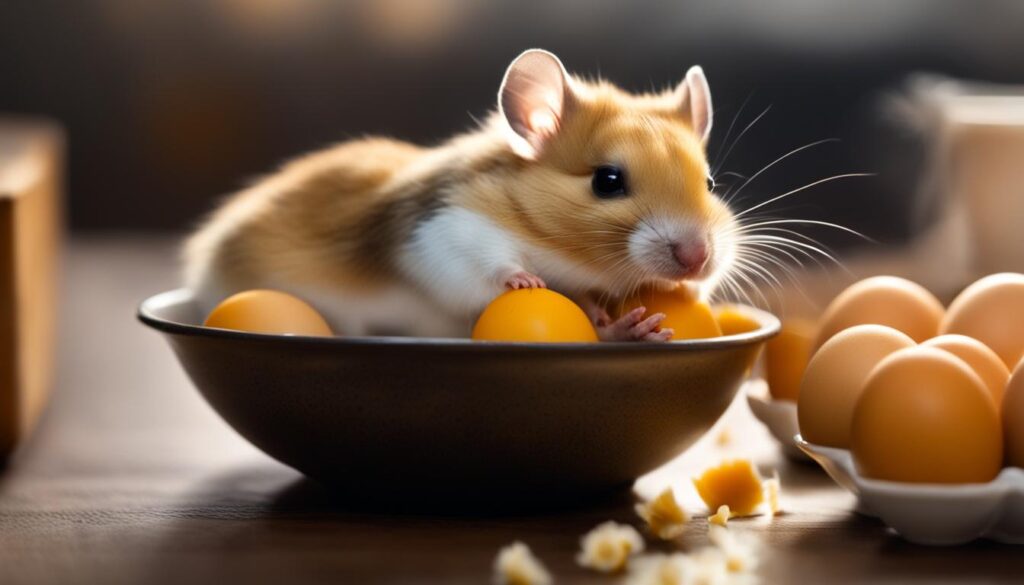
Hamster Nutrition Tips:
While eggs can be a nutritious addition to your hamster’s diet, it’s crucial to offer them in moderation and alongside a balanced diet. Remember these key tips:
“Offer eggs in moderation as a supplement to their regular pellet diet, as hamsters’ primary food source should be a commercial pellet diet formulated for small rodents.”
In addition to eggs, hamsters should receive a variety of fresh fruits, vegetables, and whole grains to ensure a well-rounded diet. Remember to provide your hamster with fresh water at all times.
| Egg Preparation Method | Tips |
|---|---|
| Scrambled Eggs | Use a non-stick pan and cook without any added oil or seasonings. |
| Hard-boiled Eggs | Cook the egg until fully set, and remove the shell before serving. |
Balance and Variety in Hamster’s Diet
While eggs can be a healthy treat for hamsters, it’s important to maintain balance and variety in their diet. Hamsters should primarily consume a commercial pellet diet that provides the necessary nutrients and protein. Along with pellets, hamsters can be offered small amounts of fresh fruits, vegetables, and whole grains.
It’s important to limit fruits as they are higher in sugar and less nutritious compared to vegetables.
Good options for hamsters include:
- Romaine lettuce
- Carrot
- Cucumber
- Pears
- Bananas
- Berries
Variety is key to providing hamsters with a well-rounded diet, ensuring they receive all the necessary vitamins and minerals.
Comparison of Nutritional Values
| Food | Protein (per 100g) | Fiber (per 100g) | Vitamin C (per 100g) |
|---|---|---|---|
| Pellets | 20g | 5g | – |
| Romaine Lettuce | 1.2g | 1.2g | 4mg |
| Carrot | 0.6g | 2.8g | 0.9mg |
| Cucumber | 0.7g | 0.5g | 2.8mg |
| Pears | 0.4g | 3.1g | 4mg |
| Bananas | 1g | 2.6g | 8.7mg |
| Berries | 0.7g | 3.6g | 16.4mg |
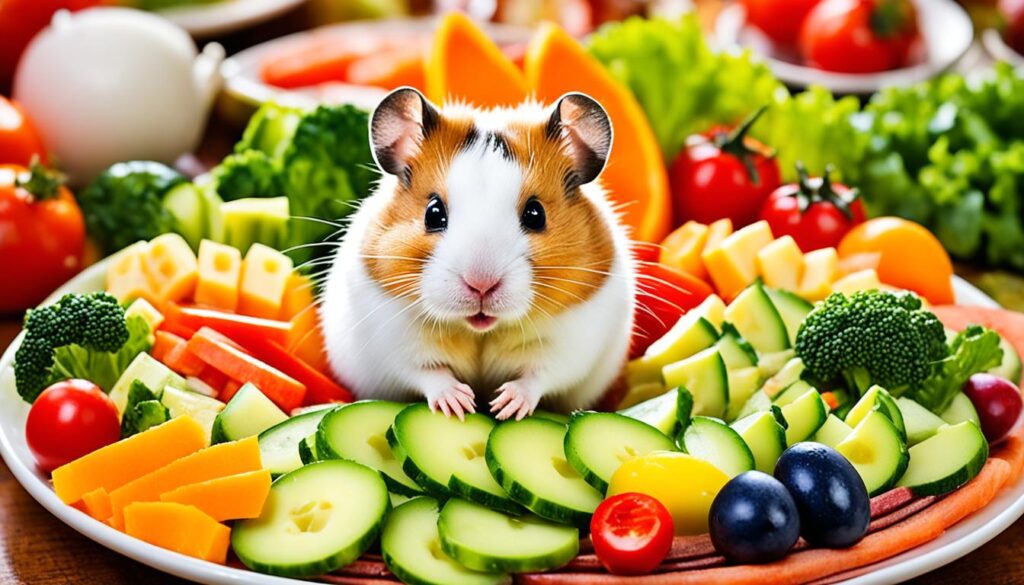
By offering a combination of pellets, fresh fruits, vegetables, and whole grains, hamsters can enjoy a varied and balanced diet.
Conclusion
Hamsters can safely enjoy eggs as a treat or supplement in their diet. Eggs are a valuable source of protein, vitamins, and minerals that can benefit the health of hamsters. However, it is crucial to offer eggs in moderation and as an addition to their primary pellet diet. The key to a well-balanced hamster’s diet lies in variety. Alongside eggs, hamsters can be provided with small amounts of fresh fruits, vegetables, and whole grains.
Maintaining a balanced diet is essential for hamsters’ overall well-being. While eggs offer great nutritional value, they should not replace the main diet of commercial pellets formulated specifically for small rodents. These pellets ensure that hamsters receive the necessary nutrients and protein tailored to their specific needs.
By integrating a variety of foods, including eggs, into a hamster’s diet, owners can provide their pets with a range of essential nutrients while ensuring their dietary needs are met. Additionally, always ensure that your hamster has access to fresh water at all times to support their digestion and hydration.
